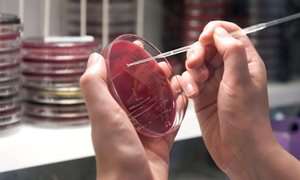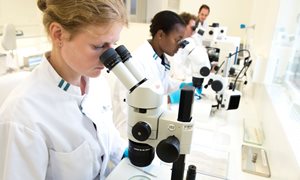

About
We focus on detection, diagnosis and treatment of infectious diseases caused by microorganisms such as bacteria, viruses, parasites and fungi.
Patient care
For information about our patient care, please see our department's Dutch page.
see page (Dutch)International patients
Everything you need to know as a foreign patient. Especially if you are not insured through the Dutch health care law.
read moreOur focus areas

Hygiene and Infection Prevention
The Hygiene and Infection team (HIP) advises healthcare departments in our hospital about preventing infections.
read more
Education
The department of Medical Microbiology is involved in education in a variety of ways.
- We offer degree programs which train students to become medical microbiologists and medical molecular microbiologists.
- Medical Microbiology contributes to the degree program which trains students to become infectiologists.
- Medical interns can come to receive a brief introduction to medical microbiology.
- Researchers in training and students (WO and HBO) can come to our department for education and internships.
- We offer a degree program which trains students to become infection prevention experts.
Degree program medical microbiologist
The degree program which trains students to becoming a medical microbiologist can be taken after the Medicine study program and lasts for 5 years. During the degree program, students are taught to provide support in the field of infectious diseases. Students also learn to carry out the following tasks:
- laboratory diagnostics
- peer consultation
- laboratory management
- policy formation and development of protocols and guidelines
- epidemiology of infectious diseases and hospital hygiene
- public healthcare
- providing information, education, and training
- scientific research
Upon completion, students are registered as medical microbiologists in the register of specialists (MSRC). View the entire degree program curriculum on the website of the Nederlandse Vereniging Medische Microbiologie (Netherlands association of medical microbiology).
Medical Molecular Microbiologist degree program
The Medical Molecular Microbiologist (MMM) degree program delves deeper into the development, performance, and interpretation of molecular diagnostic research in microbiology.
This two-year degree program begins after registration as a Medical Microbiological Researcher (MMO) with the Stichting voor Opleiding tot Medisch-Biologisch Wetenschappelijk Onderzoeker (SMBWO - Foundation for the training of medical-biological scientific researchers). Information about the MMO degree program can be found in the Medical Microbiology section on the website of SMBWO.
The degree program is divided into 3 periods. After each period, an evaluation by the instructor will follow. The general format is as follows:
- 18 months of molecular diagnostics and molecular epidemiology
- 4 months of conventional bacteriology, virology, parasitology, mycology, and serology
- 2 months of infection prevention, quality, management, and education
As a Medical Molecular Microbiologist in training, you will record your progress in a log book. You will discuss this with your instructor. They will sign your log book.
After a discussion in the general assembly of the Concilium Microbiologicum Medicum (MMM), you will receive the certificate of “Medical Molecular Microbiologist”. Next, you will be entered into the MMM register of the Nederlands Vereniging voor Medische Microbiologie (Netherlands association for medical microbiology).
Read the full description of the Medical Molecular Microbiologist degree program and the professional profile on the website of the Nederlandse Vereniging voor Medische Microbiologie.
Clinical Mycology course for interns
Clinical mycology is a small but significant part of medical microbiology. Mold can cause serious infections in patients with weakened immune resistance. That is why it is very important to start with the right antifungal agent in the proper dosage to the patient. The course is specifically designed for PhD candidates in medical microbiology and is annually offered by the Expertisecentrum voor Schimmelinfecties (Expertise center for fungal infections) of Radboud university medical center/CWZ hospital.
- Course information (in Dutch)
Our labs

Bacteriology
In our bacteriology laboratory, we perform diagnostics in the field of bacterial infections. Medical microbiologists conduct many consults regarding the interpretation of testing and results. read more
Clinical virology
Clinical virology provides rapid, adequate virological diagnostics and consultation for various patient groups inside and outside of Radboud university medical center. read moreClinical virology
Clinical virology provides rapid, adequate virological diagnostics and consultation for various patient groups inside and outside of Radboud university medical center. In addition to standard serological and molecular diagnostics for patients at the 1st, 2nd, and 3rd levels of care, virological diagnostics focuses on specific patient groups at the academic medical center:- Immune-compromised patients (due to transplants, hematological malignancies, immune diseases, congenital disease, or medication).
- Patients with HIV and/or chronic hepatitis.
- Patient groups for which the Radboud university medical center operates as a knowledge center:
- The department of Medical Microbiology at Radboud university center, along with the AMC and the RIVM (National Institute for Public Health and the Environment) component of the Landelijk Expert Centrum Lyme (National Lyme expertise center). To do that, we perform high-quality diagnostics in the field of infections with Borrelia spp and we provide supporting consultation via a team of infectiologists and microbiologists.
- We conduct extensive Q-fever diagnostics in support of the Radboud Q-fever Expertise Center. This center was founded to optimize multidisciplinary care for (chronic) Q fever patients.

Medical parasitology
Our laboratory provides diagnostics into all parasitic infections. We have special expertise in the field of malaria diagnostics. read moreMedical parasitology
Our laboratory provides diagnostics into all parasitic infections. We have special expertise in the field of malaria diagnostics.Malaria diagnostics entail:
- Suspicion of acute infection: CITO diagnostic (024-818 70 95) microscopy using QBC, thick smear, swab.
- Exclusion of exposure in the past: serology.
- Suspicion of very low infection (tropical splenomegaly syndrome): serology and PCR.
- Confirming positive microscopy or species: PCR.
Our infectiologists and medical microbiologists also offer consultative services for the support of diagnostics and treatment of tropical and parasitic infections.

Mycobacteriology
In the laboratory for Mycobacteriology, we provide all facets of clinical mycobacteriology.
read moreMycobacteriology
In the laboratory for Mycobacteriology, we provide all facets of clinical mycobacteriology. Our goal is to optimize the diagnostics and treatment of mycobacterial infections in both the Netherlands and abroad. In our laboratory, we conduct both cultivation and susceptibility testing for patient care and research under biosafety class 3 (BSL-3) conditions. In our laboratory, we are also able to work with other BSL-3 pathogens, e.g. Brucella species, Francisella species, and Histoplasma species.
We are a leading international laboratory in the field of susceptibility testing for non-tuberculosis mycobacteria (NTM) and in the cultivation of mycobacteria that are difficult to grow. Examples of these are Mycobacterium haemophilum and Mycobacterium genavense. We comply with all the relevant guidelines in this field and send our samples around Europe for quality control. We work closely with an international team of highly respected lung specialists, infectiologists, and medical microbiologists on providing consultative services to support the diagnostics and therapy of mycobacterial infections.
T (024)361 89 51
E for clinical inquiries: jakko.vaningen@radboudumc.nl
nicolien.hanemaaijer@radboudumc.nl
E for laboratory results tuberculoseuitslagen.mmb@radboudumc.nl

